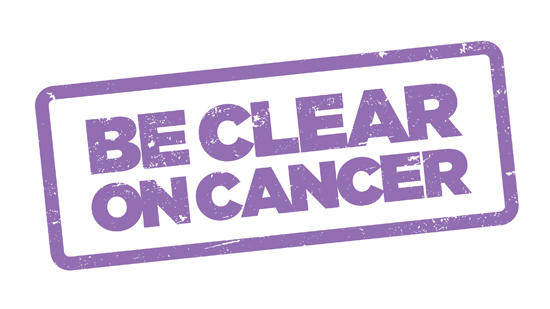Evaluation findings

Campaign materials
Briefing sheets and marketing materials (e.g. leaflets and posters) are available on the resources and tools page.
Information on this page aims to share the results of oesophago-gastric cancers pilot campaigns, which may be helpful to those planning local activity, preparing for an upcoming national campaign or interested in the impact of Be Clear on Cancer on oesophago-gastric cancers referral and survival outcomes.
One regional oesophago-gastric cancers pilot ran in the Northern England Strategic Clinical Network (SCN) area from February – March 2014. Research identified a significant uplift in spontaneous awareness of oesophago-gastric cancers symptoms post-campaign:
- 57% spontaneously mentioned they had seen publicity about cancer symptoms, and of those people [1];
– 31% in the pilot region spontaneously mentioned "heartburn"
– 24% mentioned "difficulty in swallowing food"
- 63% agreed the advertising had told them something new [1]
When comparing the campaign period with the same time previous year, it showed;
- 52% increase in 2WW referrals for suspected upper GI cancers, compared with a 17% increase in the control areas (rest of England, excluding local and regional pilot areas) [2]
- Early indications of an increase in the number of Barrett’s oesophagus cases diagnosed (a condition known to increase a person's risk of oesophageal cancer) [3]
Currently there is no control group to compare these findings against, and not all trusts who participated in the regional pilot have been able to share their data yet, therefore the significance of this increase isn’t yet clear.
- The total number of upper GI cancers diagnosed did not increase following the campaign however there was a significant increase of 29 percentage points^ in the proportion of upper GI cancers diagnosed via a 2WW referral, among those aged 60–69 only [2]
This finding for people in their 60s is encouraging since we know that 12 month relative survival for those diagnosed by emergency presentation is lower than for those diagnosed via a 2WW referral. We also know that the association between age and the percentage of patients diagnosed by emergency presentation is highest in the elderly. However, further data over time will be required before we can fully understand the impact of this activity.
Note: ‘Upper GI’ refers to ICD10 C15-C16, C22-C25
^Based on a small number of cases and there was some variation in the data over time among the 60-69 age group, therefore the observed increase may not be wholly attributable to impact of the campaign.
References
1. TNS BMRB on behalf of Public Health England, post-OG campaign survey of 300 adults aged over 50 interviewed face-to-face in the North East region, 12th – 25th March 20 14
2. Data from the National Cancer Waiting Times (CWT) Monitoring Dataset provided by NHS England and accessed via Public Health England’s Knowledge & Intelligence Team (East Midlands).
3. Data supplied by individual NHS trusts who participated in the regional pilot which ran in the Northern England Strategic Clinical Network (SCN) area, (Feb-Mar 2014)
Seven local projects have focussed on oesophago-gastric cancers. These projects covered the North of England; County Durham and Darlington; Dudley; Sandwell and Wolverhampton; Anglia; Hertfordshire, Luton and South Bedfordshire; and Wandsworth and ran between April and July 2012.
When comparing the campaign period with the same time previous year, the results were as follows:
- 26% statistically significant increase in urgent GP referrals (two-week wait (2WW)) for suspected upper gastrointestinal (GI) cancers in pilot areas, compared with a 16% increase in control areas [1]
- 20% increase (not significant) in oesophageal cancers diagnosed following a 2WW referral for suspected upper GI cancers in the pilot area, compared with 3% increase in the control area [1]
- No change to the oesophageal cancer conversion rate [1]
Download a Cancer Research UK evaluation poster
Download a Be Clear on Cancer Evaluation Summary 2014
References
1. Cancer Research UK.Improving the early diagnosis of oesophago-gastric cancers; findings from seven local Be Clear on Cancer pilots.London: Cancer Research UK; 2012
Be Clear on Cancer statement
Be Clear on Cancer was a cancer awareness campaign led by Public Health England, working in partnership with the Department of Health and NHS England. This page contains links to documents that we hope you find useful. Please note however that the views or opinions expressed within those links are not necessarily those of Cancer Research UK.
